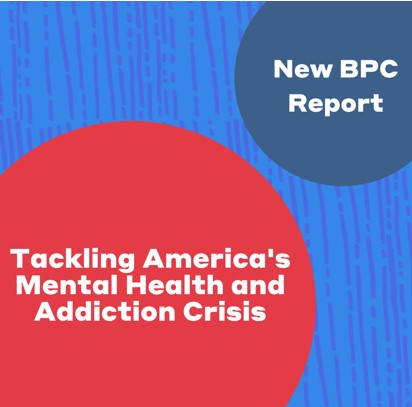Primary and behavioral health care integration comes down to four core policy changes
OAKLAND, CA–– MARCH 31, 2021 –– Bipartisan Policy Center released today a new report outlining what legislative and regulatory changes have to happen to make mental health a part of Americans’ primary and behavioral health care experience. Tackling America’s Mental Health and Addiction Crisis Through Primary and Behavioral Health Care Integration was jointly commissioned by the Sunflower Foundation, the New York Community Trust and Well Being Trust, a national foundation dedicated to advancing the mental, social, and spiritual health of the nation.
“Integrating mental health into the places that people are, especially foundational places like primary care, is arguably more essential today than ever before,” says Dr. Benjamin F. Miller, PsyD, Chief Strategy Officer of Well Being Trust.
Since the Covid-19 pandemic began, adult symptoms of anxiety and depression increased four-fold; one in four 18-24 year olds seriously considered suicide; and drug overdose deaths hit the highest number ever recorded in a 12-month period.
In response, Bipartisan Policy Center created a Behavioral Health Integration Task Force – co-chaired by former Rep. Patrick J. Kennedy; former Sen. John E. Sununu; Sheila P. Burke, BPC fellow and chair of the federal public policy group at Baker Donelson Berman & Berkowitz; and Richard G. Frank, Margaret T. Morris Professor of Health Economics, Harvard University – to draft recommendations on what policymakers must do to increase Americans’ ability to access quality mental health services and supports.
The Behavioral Health Integration Task Force recommends four core changes estimated to positively impact one million Americans and cost the federal government approximately $2 billion over 10 years:
- Establish core, minimum standards essential for integration.
- Drive integration in new and existing value-based payment models.
- Expand, train, and diversify the workforce for integrated care teams.
- Promote the use of electronic health records, telehealth, and other technology to support integrated care.
“Decades of evidence show us that when mental health services are separated out from primary care services, it leads to inferior and expensive care,” Dr. Miller continued. “These policies begin to right those wrongs by developing a more person- and family-centered pathway for accessing mental health.”
View the report and recommendations
About Well Being Trust
Well Being Trust is a national foundation dedicated to advancing the mental, social, and spiritual health of the nation. Created to include participation from organizations across sectors and perspectives, Well Being Trust is committed to innovating and addressing the most critical mental health challenges facing America, and to transforming individual and community well-being. www.wellbeingtrust.org. Twitter: @WellBeingTrust






